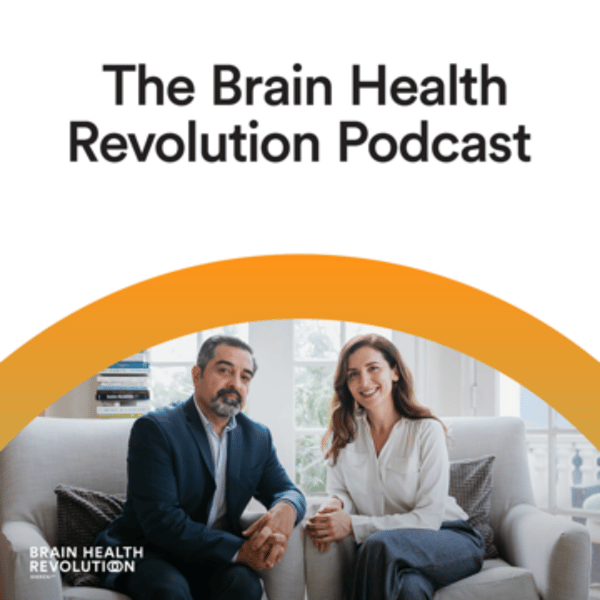Autism, Behavior and Science Miscommunication with Ben Rein, PhD
The Brain Health Revolution Podcast
Dean and Ayesha Sherzai
4.8 • 604 Ratings
🗓️ 22 December 2022
⏱️ 55 minutes
🧾️ Download transcript
Summary
In this episode, we sat down with Dr. Ben Rein, a neuroscientist and postdoctoral researcher at Stanford University and a science communicator on social media. Ben’s thesis research focused on autism spectrum disorder and identified key systems in the brain that regulate social behavior. His current research is focused on the neural basis of empathy and mechanisms by which empathic behaviors can be enhanced.
Outside of the lab, Ben creates educational science videos on social media, which is so impressive. In his videos, he summarizes recent research papers, teaches fundamental science principles, and debunks "viral" videos containing misinformation. Ben's science communication has been recognized with awards from Stanford University, the American Association for the Advancement of Science, the Mind Science Foundation and many more.
We spoke about our current understanding of autism, the advances in the field, the misinformation in the realm of neuroscience and brain and more. We hope you enjoy this conversation.
Dr. Rein's website: https://www.benrein.com
Dr. Rein's social media:
Instagram: @doctor.brein
TikTok: @dr.brein
Follow us:
Join the NEURO Academy: NEUROacademy.com
Follow us on social media:
Instagram: The Brain Docs @thebraindocs
Facebook: The Brain Docs
Website: TheBrainDocs.com
Transcript
Click on a timestamp to play from that location
| 0:00.0 | Welcome to the Brain Health Revolution podcast with your hosts, Aisha and Dean Sharesai. |
| 0:12.3 | In this episode, we sat down with Dr. Ben Ryan, a neuroscientist and postdoctoral researcher at Stanford University, and a science communicator on social media. |
| 0:23.8 | Ben's thesis research focused on autism spectrum disorder and identified key systems in the brain |
| 0:30.8 | that regulate social behavior. His current research at Stanford University is focused on the |
| 0:36.6 | neural basis of empathy |
| 0:38.0 | and mechanisms by which empathic behaviors can be enhanced. |
| 0:43.1 | Outside of the lab, Ben creates educational science videos on social media, |
| 0:48.1 | which is so impressive and so needed. |
| 0:50.8 | In his videos, he summarizes recent research papers, teaches fundamental science principles, |
| 0:57.2 | and debunks viral videos containing misinformation. Ben's science communication has been recognized |
| 1:03.3 | with awards from Stanford University, the American Association for the Advancement of Science, |
| 1:09.5 | the Mind Science Foundation, and many more. |
| 1:12.3 | We spoke about our current understanding of autism, the advances in the field, the misinformation |
| 1:18.3 | in the realm of neuroscience and brain, and much more. We hope you enjoy this conversation. |
| 1:24.4 | Thank you for joining us. Ben, it's so nice to meet you. Thank you so much for joining us. |
| 1:31.2 | Yeah, thank you so much for having me. I'm looking forward to our discussion. Dean and I have really |
| 1:35.0 | enjoyed your posts and your Instagram and TikTok presence and how you simplify the neuroscience |
| 1:43.6 | of behavior, just being a human being at this day and age, |
| 1:49.1 | and try to bust some myths about brain. |
| 1:53.1 | And so we were looking forward to speaking with you about your work and about how your day goes as a neuroscientist and you know what your interests are so |
| 2:03.5 | really excited to be here yeah it's one of the things we we really enjoy is reason-based content and |
| 2:13.9 | and i always say i love tic-tok and social media as much as people think it's got a lot of bad, which is 99.9%. |
... |
Please login to see the full transcript.
Disclaimer: The podcast and artwork embedded on this page are from Dean and Ayesha Sherzai, and are the property of its owner and not affiliated with or endorsed by Tapesearch.
Generated transcripts are the property of Dean and Ayesha Sherzai and are distributed freely under the Fair Use doctrine. Transcripts generated by Tapesearch are not guaranteed to be accurate.
Copyright © Tapesearch 2025.

